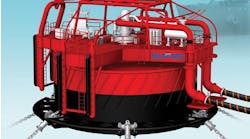Managers who don't think about outsourcing spend too much time thinking about back-office processing. Outsourcing allows companies to focus on the core business, leveraging expertise for profit by letting outside suppliers handle non-core functions. Operators find oil, the outsourcer does accounts payable, and everyone enjoys the best of both worlds.
The advice "stick to your knitting" is very old wisdom, but new visions of outsourcing for the 21st century might look more like blueprints for a revolution. The upstream offshore sector has always taken a global view, but modern outsourcing concepts wring value out of the global village phenomenon to a greater degree than previously imagined. Three key elements are involved:
- International physical delivery architecture based on a hub-and-spoke model
- De-coupled processes wherein both location and systems are segregated
- Collaborative processing, where business counterparts are actively engaged in the standardization of processing.
The concept of hub-and-spoke architecture is an old one developed for the western world, but which becomes more attractive as globalization dissolves political frontiers. Under the model, a global processing hub serves and is fed by regional or on-site operations - the spokes. Many companies across the industrial and service sectors see opportunities in moving global hubs away from regions at home or near the head office to foreign locations where labor cost arbitrage can drive profitability.
A back-office processing center in, say, India, may seem like fantasy for a small exploration outfit. Larger companies may see it as an impossible venture into a foreign culture that eclipses the skills and knowledge required for the establishment of project-related local infrastructure. That's where outsourcing brings value. A specialist in business processing with an active local presence can build scale in the lowest-cost location: PricewaterhouseCoopers currently supports a range of activities from India, including finance, accounting, and information technology (IT) services.
Outsourcers can assist with the spokes, too. Companies that want to stick their toe in the water of a local business community without making large investments should consider outsourcing the initial entry in a country. Outsourcing the problem of "how do we get going" allows companies to move into new territories with a jump-start. Back office development need not prevent operations from beginning on day one. Companies can get in faster, with greater control and greater accuracy. Then, when the time comes, get out more quickly too, since there is no follow-up administrative debris to sweep away.
The second theme, de-coupling business processing systems architecture, is a step bolder, but one that more completely exploits the efficiencies of the hub-and-spoke model. Consider, for example, the finance and accounting functions. Segregate them in principle and practice from front-office activities such as sales and abandon the incumbent software that supports them. The outsource supplier will replace it with a standard system used in the remote hub for multiple clients. Front office functions will retain the incumbent systems architecture, with middleware facilitating data transfer between the two using standard XML scripts, the language of the Internet.
The advantages of the model touch both the outsourcer and the customer. With all clients invisibly supported by discrete accounts on the same system, the outsourcer benefits directly from the scale made possible through standardized back-office processing. Today outsourcing in the oil and gas sector is almost invariably bespoke, but de-coupling will drive scale across divisions, clients, and industry, across the globe. The client reaps an equally attractive benefit; the front office is freed from restrictions on systems development that may come from back-office managers. When managers talk about their sales system, they need not worry about how it sits with the finance and accounting people. The freedom principle is equally attractive for the numbers people, catapulting the client and outsourcer to a new, mutual, best-of-both-worlds relationship.
If the idea of de-coupling is radical, collaborative processing is revolutionary. It involves a back-office partnership between trading partners, facilitated by an outsource supplier. Today when a purchase order is drawn up and mailed to a supplier, the recipient tends to use the data it contains to create a sales order. The buyer's purchase-to-pay process and the supplier's order-to-cash process mirror each other perfectly, creating enormous and wasteful duplication. Electronic advances may have removed some of the paper from the chain, but technology has been used only to enhance existing processes in silo enterprise systems.
Re-engineering through collaborative processing, an Internet-based approach, remains on the horizon in most sectors and for almost every company. Ultimately, though, outsourcers' middleware will drive the documentation, generating paper sometimes, and more often creating logical electronic documents that move between systems. The re-keying and scanning common in the infant e-business world will be eliminated, and the purchase order and sales order, physical or virtual, will be one and the same. PricewaterhouseCoopers estimates that in a fully collaborative environment, full-time-equivalent human resources costs could be slashed by 60%. The only real challenge is summoning the collective will to achieve those savings. It requires much more than the input of a few accounts payable clerks. Management has to buy into the collaborative processing vision.
Once done, outsourcing has something of a bandwagon effect, as companies look at other aspects of their business and come to the realization that certain functions are decidedly non-core. In the exploration business, that would include almost everything.
David Narrow
PricewaterhouseCoopers
This page reflects viewpoints on the political, economic, cultural, technological, and environmental issues that shape the future of the petroleum industry. Offshore Magazine invites you to share your thoughts. Send your manuscript to Beyond the Horizon, Offshore Magazine, Box 1941, Houston, TX 77251 USA. Manuscripts will not be returned.


